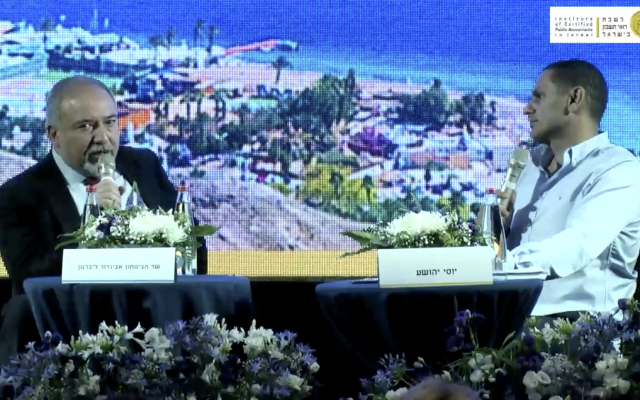
Defense Minister Avigdor Liberman is interviewed onstage by the Yedioth Ahronoth newspaper’s military correspondent Yossi Yehoshua at the Institute of Certified Public Accountants in Israel’s annual conference in Eilat on June 5, 2018. (Screen capture)
Defense minister also speaks about Gaza crisis, saying improving humanitarian condition in the coastal enclave won’t bring an end to Hamas terror
(SOURCE) Defense Minister Avigdor Liberman on Tuesday said Iranian Supreme Leader Ali Khamenei’s recent call to ramp up the country’s uranium enrichment is indicative of “mass hysteria and panic” in Tehran over internal unrest in the Islamic Republic.
“The pronouncement by the Supreme Leader Ali Khamenei about enriching uranium is first and foremost a sign of mass hysteria and panic by the Iranian high command,” Liberman said, speaking in an onstage interview at the Institute of Certified Public Accountants in Israel’s annual conference in Eilat.
In his speech, the defense minister also reiterated Israel’s demand that Iranian forces and proxies leave Syria, amid ongoing negotiations on the subject with Russia and the United States.
On Monday, Khamenei announced that he’d ordered Iranian atomic authorities to increase the country’s nuclear enrichment capacity, in a speech marking the start of the 30th year of his reign. The increase, he said in his speech, would not exceed limits set by the 2015 nuclear accord, which European countries have said they hope to salvage after US President Donald Trump ended American involvement in the deal.

Iran also notified the International Atomic Energy Agency that it plans to increase its uranium enrichment capacity, its nuclear chief Ali Akbar Salehi said.
“If conditions allow, maybe tomorrow night at Natanz, we can announce the opening of the center for production of new centrifuges” for uranium enrichment, said Salehi, a vice president and head of the Iranian Atomic Energy Organization, according to Iran’s Fars news agency.
“What we are doing does not violate the (2015 nuclear) agreement,” he said, adding that a letter was submitted to the IAEA “yesterday regarding the start of certain activities.”
Liberman credited the panic to strains on the Iranian economy. He said this has only gotten worse with Trump’s decision to leave the nuclear deal and reimpose sanctions on Iran, prompting some international companies to halt all ties with the country, most recently the European car manufacturer Peugeot.

“In the entire Khamenei era, there haven’t been strikes and demonstrations like what we’ve seen in the past few months, especially in the last month,” Liberman said.
The call to increase uranium enrichment capacity was part of a series of actions and statements by Iran “to signal, to blackmail, to threaten that they’ll leave” the nuclear agreement.
Asked if Israel were prepared to carry out a military strike against Iran if it begins developing a nuclear weapon, Liberman said: “All options are on the table.”
Iran out of Syria
The defense minister repeated Israel’s calls for Iran and its proxies to completely leave Syria and not merely keep away from Israel’s Golan border, as Russia has reportedly offered to get the Islamic Republic to do.
“We want Iran and Hezbollah to leave Syria. We won’t accept that someone is trying to develop another front in Syria against us, and therefore we demand that Iran and Hezbollah leave,” Liberman said.
“This is a condition of any possible agreement,” he said.

For years, Israel has been waging a quiet campaign against Iranian interests in the country. That campaign came to light and stepped up considerably in February, after an Iranian drone carrying explosives briefly entered Israeli airspace before it was shot down and Israel launched a counterattack on the T-4 air base in central Syria from which the drone had been piloted. Israel attacked the T-4 air base again in April after Iran brought in an advanced anti-aircraft system, killing at least seven members of Iran’s Islamic Revolutionary Guard Corps.
On May 10, after weeks of threats, the IRGC’s al-Quds Force launched 32 rockets at Israel’s forward defensive line on the Golan Heights border, Israel said. Four of them were shot down; the rest fell short of Israeli territory. In response, over the next two hours, Israeli jets fired dozens of missiles at Iranian targets in Syria and destroyed a number of Syrian air defense systems.

In recent weeks, Israel has stepped up its negotiations with Russia, and to a lesser extent the United States, in order to secure an Iranian withdrawal from Syria as the civil war there starts winding down. According to reports, Moscow has offered to force Iran to pull its forces from the area closest to the border.
Liberman said this would not be enough, as the range of Iranian missiles makes the comparatively small buffer zones ultimately irrelevant.
“It doesn’t matter if it’s 40 kilometers or 80 kilometers. If they’re setting up missile systems in Homs, Hama or in Deir Ezzor, they will have enough range to hit Israeli territory,” the defense minister said.
If they’re setting up missile systems in Homs, Hama or in Deir Ezzor, they will have enough range to hit Israeli territory
Liberman also spoke briefly about Israel’s military activities in Syria to combat both Iranian entrenchment in the country and the import of advanced weaponry from Iran to Syria and Lebanon.
Israel has long maintained that these two issues are “red lines” that it is prepared to take military action to address.
Jerusalem once maintained a strict policy of not commenting on airstrikes in Syria, but has become increasingly vocal on the subject in recent weeks.

Liberman said the transport of advanced Iranian military technology to Syria and Hezbollah in Lebanon appears to be continuing and acknowledged that ” we don’t see some of the transfers.”
The defense minister said Israel would only take action against such transfers if it were clear that advanced weaponry was involved, which would likely be used against Israel and not against Syrian rebels or terror groups.
“But if an anti-aircraft system arrives, it’s clear it’s not for Daesh,” Liberman said, using the Arabic nickname for the Islamic State group.
“An anti-aircraft system endangers air transportation from Tel Aviv and northward, including civilian flights as well as military. We will not accept a situation in which the Iranians are closing our skies,” he said.
The defense minister also commented on the fact that the Hezbollah terrorist group has largely stayed out of Iran’s fight against Israel from Syria, despite maintaining a large presence in the country.
Liberman credited Hezbollah’s relative inaction with its own internal concerns, namely the recent Lebanese elections and its ongoing fighting on behalf of Assad.
“So they have other problems now. But whoever thinks that they’re just sitting and waiting for the Messiah to come is wrong. They’re continuing to build up their strength,” he said.
Gaza’s humanitarian crisis
Liberman also discussed recent tensions with Gaza and appeared to disagree with Prime Minister Benjamin Netanyahu and senior military officials concerning the negative impact that the deteriorating living conditions in the Gaza Strip are having on the security situation there.
The Gaza Strip has one of the highest rates of unemployment in the world — over 60 percent among adults under the age of 30 — and gets just a few hours of electricity per day in light of an ongoing conflict between the Palestinian Authority and Hamas, which rules the Strip, over who should pay the bill.

“Whoever thinks that improving the civilian and humanitarian reality in Gaza will prevent the kites and fire is wrong and is misleading [people],” Liberman said, referring to kites with incendiary devices attached to them that have been flown into southern Israel, sparking hundreds of fires across the area.
This appeared to be a response to a comment made by Netanyahu the day before from Germany, where he was on an official state visit, and by a senior IDF officer last week.
“I spoke with Chancellor Merkel about the situation in Gaza and repeated the fact that the entire border situation is due to the economic situation. Plain and simple,” Netanyahu said.
Israel was “examining various possibilities to prevent a humanitarian collapse in Gaza,” he added.
Last week, a senior IDF officer told reporters that the conditions in Gaza were at a nadir.

“Hamas is in its worst situation since it came to power [in 2007], and the same is true of the Gaza Strip. The responsibility for that lies first of all with Hamas, but we can also take steps,” he said.
In his onstage interview, Liberman came out sharply against the idea, saying similar efforts to improve the lives of Gazans had failed in the past, notably Israel’s decision to remove all settlements and military positions inside the coastal enclave in 2005.
“It’s like ‘land for peace.’ With the Gaza Strip, we’re already back to the 1967 lines. We gave them land and instead of getting peace, we got Qassam rockets,” he said. “The same thing will happen here.”

You must be logged in to post a comment.